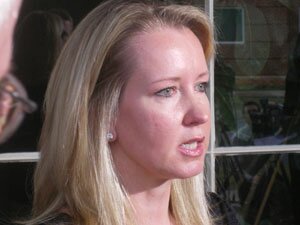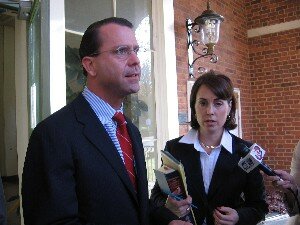NEWS- Final sentence: AA apologizer gets time
Before he was led away in handcuffs last week, a new image emerged of William N. Beebe, the frat house assailant whose written apology led him to jail nearly 23 years after the crime. Friends who spoke on his behalf at his sentencing hearing in the Charlottesville Circuit Courthouse March 15 described a man recovering from addiction and working tirelessly to help others do the same.
"Rehabilitation is not an issue here," Judge Edward Hogshire said before announcing the sentence– 10 years with all but 18 months suspended– acknowledging that for the past dozen years, the 42-year-old, who pleaded guilty last year to felony sexual battery, has been an inspiration to numerous addicts, many of whom were in the courtroom to testify on his behalf.
"I looked like a cross between the unibomber and Jerry Garcia," said William Daniel Griggs. "He saw right through me, and was very insistent that this was the right way." Griggs related that when his older son was born, the child had to be on a ventilator, and anyone who wanted to take care of the ailing baby had to attend special classes on how to administer CPR and remove and insert a feeding tube.
"The only two people who showed up were Will and my father-in-law," said Griggs, noting that Beebe stayed with the sick child on numerous occasions to give the exhausted parents a break.
Marcy Allen, in her mid-20s, spoke of her life before she met Beebe. "I did not shave or bathe– washed my hair twice a year," a situation she attributed to her drug problems that also led her to embezzle money from her employer, which Beebe insisted she repay.
Quagliana says the stories heard in court speak to her client's character and that the simple fact that so many people were willing to go public with their private pain cast new light on the mysterious Beebe, who has steadfastly declined interviews.
"For people in recovery, their participation in the recovery community and the anonymity of that sort of organization is very, very important," Quagliana says.
Seccuro did not testify, but she presented the court with a nearly five-page statement describing years of panic attacks and a diagnosis of Post Traumatic Stress Disorder.
"The impact of that night," she wrote, "resonated in my mediocre grades, my disastrous first marriage, my missed opportunities, and low self-esteem."
While she said she found happiness in her work as an event planner, in her second marriage, and as mother, she said the initial "I harmed you" letter from Beebe brought her pain to the surface again. "Panic and fear rule my life now," she wrote.
As Deputy Commonwealth's Attorney Claude Worrell announced in court in December, an investigation is ongoing because "other sexual assaults occurred that night in that fraternity."
Seccuro has said she has no memory of other sexual assailants, but that rumors she heard immediately after the incident in 1984 led her to believe others might have been involved. So far, no other charges have been filed.
The case made headlines after Seccuro first went public in the Hook's January 12, 2006 cover story, recounting the night of October 5, 1984, when she attended a party at Phi Kappa Psi fraternity, at the north end of Mad Bowl on Rugby Road.
Then a 17-year-old virgin, Seccuro recalls accepting a "citrusy" green-colored drink. After she drank some, she felt woozy, and she recalls being brutally assaulted by Beebe in his room. Although she attempted to press charges at the time, and wrote a first-person account of the assault in the now-defunct University Journal, she says the UVA administration thwarted her efforts to seek justice. To this day, she says, UVA does not provide strong support for students who are sexually assaulted despite having rewritten its sexual assault policy in early 2005.
UVA spokesperson Carol Wood declines comment on the case except to say, "Securro is a courageous woman who was committed to seeing this through." Of the sentence, Wood adds, "Justice was served on her behalf."
Earlier this year, Wood said that administrators including President John Casteen had reached out to Seccuro and were willing to help with the investigation. Seccuro, however, disputes the claim and plans to push for further sexual assault reform at UVA and other campuses through her new nonprofit, STARS, Sisters Together Assisting Rape Survivors.
Unlike most victims of sexual crime, Seccuro has been outspoken about her experience. The story has been featured in hundreds of newspaper accounts across the country, and she has been interviewed on national and international television programs including Dateline NBC and the Today Show.
Beebe, by contrast, has confined his public statements to prepared remarks, but he has reiterated his desire to make amends.
"If that's the case, he ought to stand up and say, 'Okay, give me two years,'" Worrell said, arguing at sentencing that such a statement would have allowed Seccuro to "find some measure of justice."
Instead, Worrell said, Beebe used the court as an "exercise" to show "how fabulous and how much of a spiritual person he has become."
Although Beebe's plea agreement recommended a two-year sentence, which might have allowed his parole after just a few months, Worrell asked the judge to impose a harsher sentence: 15 years, with 13 suspended. The plea, he said, was based on Beebe's offer to help with the continuing investigation. But while Beebe readily met with prosecutors, "he wasn't helpful," said Worrell.
"He can't tell things that aren't true," retorted Quagliana, who said Beebe has shared what he knows and that being labeled a violent sex offender and a felon for the rest of his life would be sufficient punishment. Beebe's sentence would essentially punish his loved ones, she said, particularly his ailing mother.
"There is concern that he might not see her alive again," Quagliana says now. "He is her only close living relative."
Seccuro says she is sympathetic. In her victim impact statement, she wrote, "I am deeply sorry to hear of Mr. Beebe's mother's ill health. I am certain this must be very difficult for them both."
She also wrote that she recognizes Beebe has "turned his ship around," but that it does not mitigate the need for punishment. In his apology, she wrote, "He was grasping at moral absolution so he could move on with his life. He wanted a blank check, a clean slate."
Now in Charlottesville Albemarle Regional Jail awaiting assignment to the state prison system, Beebe is doing "as well as can be expected," says Quagliana. "He always anticipated that he would have to face some consequences for what happened."
Seccuro says she's ready to move forward now that the sentencing phase is complete.
"I forgive him," she said following the hearing.
What she cannot overlook is the lack of genuine remorse or empathy she feels Beebe and Quagliana have shown her. At sentencing, Quagliana called Seccuro's response to Beebe's apology "ugly and self-serving."
Despite Beebe's guilty plea, Quagliana "had not one word of solace whatsoever regarding what I had been through at the hands of her client," says Seccuro, referring in particular to Quagliana's use of the word "ugly."
"Well," Seccuro says, "I think rape is ugly, too."
The Hook ran the following clarification on this story: The March 22 article on William Beebe's sentence, "Final sentence: AA apologizer gets time," should have stated that Securro has "some" memory of other sexual assaults that occurred the same night Beebe assaulted her. Since then, she says, witness statements and documents have confirmed her belief. Also, Securro was interviewed for a University Journal article soon after the assault; she did not author the piece.

Liz Seccuro speaks outside Charlottesville Circuit Court following William Beebe's sentence.
PHOTO BY WILLIAM WALKER
William N. Beebe with his attorney, Rhonda Quagliana, following his plea hearing in November.
FILE PHOTO BY COURTENEY STUART
#
